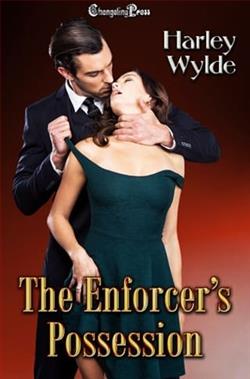When she reached the dais, her gaze flitted over him with impersonal coolness before settling on her father.
“Ah, my love,” Merle stood to take her hand. His affection for her was evident in the tone of his voice as well as the gleam in his eyes.
That Dirick even more uncomfortable. He rose stiffly beside his host, trying desperately to think of something to say in defense of his actions. After all, what the hell had a noble lady been doing dressed in peasant clothes, wandering through the town alone—in the middle of the night?
Then the thought struck him. Mayhap she no more wished for Dirick to acknowledge their meeting than he did. What had she been doing out in the night alone?
“Sir Dirick de Arlande, may I present you with my daughter, Maris Lareux, Lady of Langumont,” Merle said.
His daughter. God’s teeth, of all the women he could have accosted….
“’Tis a pleasure, my lady,” he managed to say, pressing a light kiss to her fingertips, wondering what on earth had possessed Bernard to reject the beautiful creature standing before him. He noticed the stains and scratches on what should have been a lily white hand with interest and wondered what she did other than embroidery.
“Good evening, Sir Dirick,” she said steadily.
Her refusal to meet his gaze fueled Dirick’s suspicion that she wished to ignore their previous meeting and he relaxed slightly.
As she took a seat on the far side of her father, Merle said, “Sir Dirick is lately arrived from France—Paris, I believe. I knew his father quite well, and he’ll be staying with us for some time. ”
Lady Allegra, Merle’s wife, arrived at that moment. Dirick was immediately struck by the difference between the two women who now sat at the high table. Other than the same sensual shape to their mouths and a similar creamy complexion, ’twas hard to recognize that they were mother and daughter.
While the lady of the manor was certainly beautiful, it was in a soft, almost faded way that was only partly due to her age. Her daughter, however, sparkled not only through her choice of clothing and jewels, but also in her eyes and countenance. She was vibrant whilst her mother was soft-spoken and demure.
Dirick shared a bread trencher with Lady Allegra, and as his mind raced, he occupied his hands by serving her as elegantly as the fine courtier he was. No sooner had she sipped from her wine than he refilled it. Her meat was cut swiftly into bite sized chunks with the knife that he kept at his waist. She had the choicest pieces of bread, the sweetest smelling pieces of fish. And she had charming, lightly flirtatious conversation—something at which Dirick was highly skilled.
He didn’t realize until near halfway through the meal that he’d been holding his breath, waiting to hear the roar of fury from Merle as Maris told him of their encounter. When it didn’t come, he began to relax and enjoy Allegra’s company. Though she didn’t talk much, she asked several questions and giggled like a girl at his jests. Her eyes lit up a bit then, and she ceased looking quite as faded as he’d previously thought.
“’Tis said the king will cross the channel to deal with Geoffrey now that Christ’s Mass has passed,” Merle said to Dirick as one of the pages brought a new platter, this one with stuffed turbot.
Dirick nodded, chewing his bread slowly. While he had to take care what he said—after all, he was newly come from Paris, not from the king’s side at Westminster—much of what they spoke of would only be heard between the four of them. Neither of the ladies would take much from his words, so he needn’t be overly cautious.
“Aye,” he replied. “I hear that Geoffrey is stocking his estates for war—claiming that Old King Henry meant for his son to relinquish Anjou to Geoffrey when he succeeded the throne of England. ”
“Matilda is still at Westminster with Henry?” asked Merle.
“Aye. ’Twas she that kept him from heading off to Ireland to conquer the lands for his brother William. With Geoffrey stirring the pot in Anjou, the king has trouble enough across the channel that he doesn’t need to make more war here. The rumors are that the queen’s vassals do not much like him either. ”
Merle tsked into his cup of wine as he took a long draught. “The king has his hands full,” he said, wiping his mouth with the back of a hand. “But he is a man who loves his war and action. ”
“Aye. And whilst Aquitaine seethes for her mistress, Eleanor, Anjou is about to be gobbled up by Ge
offrey. ” Dirick wiped his hands on a damp cloth proffered by a page. “And the queen is enceinte once again,” he offered in a low voice.
“Then she will not accompany her husband across the channel?” asked Maris, leaning around her father to look at him.
Dirick started, assuming that his conversation had been between himself and Merle, but he recovered quickly. “Nay, lady. She stays at Westminster—so the rumors say—because of her condition. ”
Maris quirked her eyebrow in a most becoming manner. “It might be worthwhile for the king if her majesty visited Aquitaine if ’tis in such an uproar. ”
“It’s not so bad as that…and Henry has enough problems with Geoffrey in Anjou. The king will cross the channel and leave Richard of Luci as official administrator of England. But the queen will still be here. ”
Maris made a soft sound of comprehension. “The king might appoint Luci officially, yet the queen is certain to hold her own. She will be the one truly in control. ”
Dirick almost choked on a chunk of bread, taken by surprise at her grasp of the situation, and her accurate assessment. Women didn’t talk politics—at least, women other than Matilda and Eleanor—and they were queens, for God’s sake. “Aye, my lady, I do believe you are correct. The queen stands back to none but her husband. ”
Turning back to Merle, Dirick asked, “How fares the king’s chancellor? ’Tis said he takes the court by storm. ”
“Aye, Thomas à Becket is the king’s friend as well as his chancellor. To think that it was the Archbishop who forced Henry to take him on as chancellor…now the two are nearly inseparable,” Merle replied.















